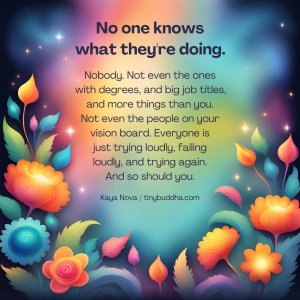
“Be there for others, but never leave yourself behind.” ~Dodinsky
Sometimes, when we’re feeling stressed and running around taking care of everybody else, the healthiest thing we can do is to stop and consider how we can take care of ourselves.
While this seems obvious to some people, many of us struggle with the idea of putting ourselves first. We were raised to think we should always put others before ourselves and ignore our own needs—that it is somehow arrogant or self-centered, and not a nice thing to do.
So why is self-care not held in high regard as the essential practice that it is for our well-being?
Here, I take a look at some misconceptions that hold us back from looking after the most important person in our lives, explore why self-care is better for others around us, and share my own list of self-care commitments, as somebody who has struggled with this in the past.
1. We think self-care means being selfish.
Taking care of ourselves is the opposite of being selfish, as it strengthens us and enables us to support our loved ones better. We are no use to anyone if our energy is depleted because we have given every last bit of it away. Self-care is an antidote to stress, as it builds resilience so we can better cope with challenges.
Just think how they tell us to put on our oxygen mask first on an airplane before we help others. Yes, absolutely support others, but nurture yourself first.
2. We confuse “rescuing” with caring.
We often sacrifice self-care because we’re too busy trying to save everyone else. But people have to learn their own lessons in life, however painful that is. Who are you to decide that you know what is right for them? Now that is selfish, as it’s based on your own desires for them, which may not truly be in their best interests.
The way we can really help is to focus on ourselves and stop trying to run others’ lives. While we think we’re caring by “rescuing” them from unpleasant experiences in their lives, we are denying them the opportunity to face their own challenges, and grow stronger or learn a lesson from doing so.
This has been a hard truth for me to face, as I always thought I was being nice and caring. It’s even tougher to accept now that a close family member of mine is very ill, mostly caused by their own actions. I have an overwhelming desire to help, and have tried on numerous occasions, but I now realize that they have to want to change.
By rescuing them every time, out of what we believe is love, the rest of the family are enabling this person to stay feeling helpless, and we are burning ourselves out with stress.
I don’t mean we should never help people, but there is a difference between providing support for somebody who asks and taking it upon ourselves to save somebody and make their life turn out in a way that we think it should.
3. We are accustomed to relationships based on neediness, not real love.
We often fall in love with the idea of being in love because we watch Hollywood films that portray love as dramatic and needing to be with somebody 24/7.
When we give from this place, we give too much because we believe we have to die for that person and other such dramatic statements. As Ernest Hemingway wrote in Men Without Women, “The most painful thing is losing yourself in the process of loving someone too much and forgetting that you are special too.”
Instead of spending our every waking hour thinking about that other person and forgetting ourselves, we (and our partners!) would be better served by focusing on ourselves. This way, we’ll be able to give from a place of wholeness, without expecting anything in return or feeling resentful.
As Rollo May said, “Love is generally confused with dependence; but in point of fact, you can only love in proportion to your capacity for independence.” If we take care of ourselves, we are more independent, less needy of getting attention or affection, and more capable of truly connecting with another human being.
4. We don’t realize we teach people how to treat us.
We teach people how to treat us by our own actions and attitude toward ourselves. By putting signs out there that you are a rescuer and will sacrifice yourself to help others, you attract the sort of people who want to be rescued and for whom it has to be all about them—not a balanced relationship.
Then, you have made it a self-fulfilling prophecy, by effectively bringing about what you always complain that you attract: people who take advantage of your good nature.
Here, it is useful to question whether they have really taken everything we have or if we have voluntarily given it all to them. Yes, they have played a part, but we can’t change them. We only have control over our own actions, so what part did we play?
Also, although this can be hard to hear, there is always a pay-off for us. Is it that you always get to be the “nice guy” or the “victim”? Take a long hard look now…
5. We expect others to take care of us.
While we might believe that our actions are purely altruistic and caring, are we actually expecting something in return?
I have previously been guilty of giving everything and believing I was being nice, but then feeling resentful when they inevitably didn’t give back in equal measure.
I complained to my friends that this or that person didn’t give me enough (and, in some cases, I wouldn’t have been wrong!) It’s easy to complain about what others aren’t doing. It’s hard to accept that we have chosen to give all our love to them and keep none for ourselves, expecting them to fill a gap they couldn’t fill, because it was our own self-esteem that was missing.
Yes, somebody may take advantage of your caring nature, but if you lie down to be walked on, you can’t be surprised when people treat you like a doormat. Your self-care is your responsibility, nobody else’s.
6. We don’t realize our worth.
Ultimately, it boils down to the fact that we think others are worth more than us. If we are confident in our love for ourselves and treat ourselves as if we are worthy, then that is what we will attract back.
Yes, I’m afraid it comes down to that whole self-love thing again! There is a reason why this is a cliché, though, because the key to meaningful relationships really is to love ourselves first.
So, What Does Self-Care Look Like?
Self-care is essential for us all, but looks different from person to person. We are all individuals with different preferences. Listen to your inner voice to find out what makes you content. Sometimes we can’t even hear our own inner voice because we are so busy anticipating the needs of those we care about, so you might have to listen carefully at first.
Below is my own personal list of self-care practices. I hope it gives you some inspiration for ways to take care of yourself.
I commit to:
1. Being fully in and embracing the present moment—mindful living
2. Preparing and eating three healthy meals a day, avoiding sugar fixes
3. Getting outside every day
4. Exercising every day
5. Doing something I enjoy every day—being creative
6. Spending time with positive people
7. Setting healthy boundaries—saying no more often
8. Identifying negative self-talk and changing it to positive
9. Pausing before reacting—do I really want to do this?
10. Getting one thing done every day, and celebrating this achievement
11. Looking after my health, body, skin, hair, teeth—regular appointments
12. Being grateful—starting each day with at least three things I am thankful for
13. Regular yoga and meditation
14. Laughing more and starting the day with a smile
15. Singing or dancing whenever possible
16. Having more fun and taking life less seriously
17. Treating myself with love and compassion—being my own best friend
18. Focusing on myself and prioritizing my needs—not focusing on the lives of others
19. Spending time alone and being still every day
20. Being my authentic self, not what others want me to be
21. Listening to my inner voice/intuition and doing what feels right for me
22. Avoiding over-analyzing a situation
23. Limiting my time on Facebook
24. Not worrying about what other people think about me
25. Getting a good sleep every night
26. Being patient with myself
27. My self-development, no matter how challenging
What’s your most important self-care practice?
About Jo Ritchie
After working in the corporate world for seventeen years, Jo redesigned her life to follow her bliss. She now travels the world running workshops and retreats and speaking about her experiences. Jo uses her background in martial arts, with her training in yoga teaching, coaching, and NLP, to help others find their power within. Visit her at joritchie.com and followyourblissblog.com.
- Web |
- More Posts













 Though I run this site, it is not mine. It's ours. It's not about me. It's about us. Your stories and your wisdom are just as meaningful as mine.
Though I run this site, it is not mine. It's ours. It's not about me. It's about us. Your stories and your wisdom are just as meaningful as mine. 